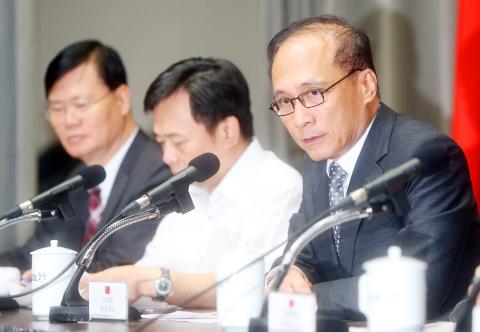The Executive Yuan yesterday formed a supervisory task force to facilitate an investigation into a breach of US money laundering rules by Mega International Commercial Bank’s (兆豐銀行) New York branch.
The task force, consisting of legal and finance experts — including lawyer Chen Chuan-yueh (高涌誠), former Judicial Reform Foundation director Kao Yung-cheng (高永成), former minister of finance Joseph Lyu (呂桔誠), former First Commercial Bank (第一銀行) chairman Michael Chang (張兆順) and former Land Bank of Taiwan (土地銀行) chairmen Tsai Jer-shyong (蔡哲雄) and Wu Fang-chih (吳藩志) — is to gauge public opinion regarding the case and facilitate probes by the Financial Supervisory Commission (FSC) and the Ministry of Justice.
“The Executive Yuan will get to the bottom of the case and hold accountable all of the people responsible,” Premier Lin Chuan (林全) told a news conference.

Photo: CNA
The FSC interviewed 28 Mega Bank officials, while the ministry is looking into suspicious accounts at the New York branch, Lin said, although little was revealed about the progress of the investigation.
The New York State Department of Financial Services (DFS) on Aug. 19 announced that the New York branch agreed to pay a US$180 million penalty for breaching US money laundering regulations.
There are 73 suspicious accounts and 174 suspicious transactions involved, but no money laundering activity has been detected so far, Lin said.
Lin reaffirmed the appointment of Mega Financial Holding Co (兆豐金控) chairman Shiu Kuang-si (徐光曦) amid criticism that Lin should be held accountable for appointing someone who was responsible for the branch’s flawed practices, as suspicious transactions between Mega Bank’s New York and Panama branches occurred during Shiu’s term as the bank’s general manager.
“Although Shiu was not totally blameless, he did not bear a large share of responsibility” in failing to report suspicious account activity to US authorities, Lin said.
Shiu was appointed as chairman after the branch was fined because he has experience dealing with a similar crisis, in which the bank’s Australian branch was not fined for breaching Australia’s money laundering regulations, Lin said.
President Tsai Ing-wen (蔡英文) was also informed of the appointment, Lin said.
Shiu is in the US to learn more about the New York branch’s operations and will prepare a formal report for the DFS, Lin said.
The FSC and the ministry are also looking into the New York branch’s practices instead of allowing Mega Bank officials to direct the investigation, Lin said in response to accusations that Shiu might cover up the branch’s activities.
The DFS was originally going to impose a bigger fine, but central bank Governor Perng Fai-nan (彭淮南) helped facilitate negotiations between Mega Bank and US authorities to reduce the fine to US$180 million, Lin said, confirming a rumor about Peng’s intervention.
Peng, who is Shiu’s brother-in-law, helped Mega Bank connect with the US Federal Reserve to negotiate with the DFS, Lin said.
The sum of the original fine cannot be revealed due to an agreement with the US, Lin said.
The case also shows that the FSC’s supervision of Taiwanese banks’ foreign branches has to be improved, Lin said.
“We have learned a painful lesson. There is apparently much room for improvement in terms of money laundering prevention and legal compliance,” Lin said.

MAKING WAVES: China’s maritime militia could become a nontraditional threat in war, clogging up shipping lanes to prevent US or Japanese intervention, a report said About 1,900 Chinese ships flying flags of convenience and fishing vessels that participated in China’s military exercises around Taiwan last month and in January last year have been listed for monitoring, Coast Guard Administration (CGA) Deputy Director-General Hsieh Ching-chin (謝慶欽) said yesterday. Following amendments to the Commercial Port Act (商港法) and the Law of Ships (船舶法) last month, the CGA can designate possible berthing areas or deny ports of call for vessels suspected of loitering around areas where undersea cables can be accessed, Oceans Affairs Council Minister Kuan Bi-ling (管碧玲) said. The list of suspected ships, originally 300, had risen to about

DAREDEVIL: Honnold said it had always been a dream of his to climb Taipei 101, while a Netflix producer said the skyscraper was ‘a real icon of this country’ US climber Alex Honnold yesterday took on Taiwan’s tallest building, becoming the first person to scale Taipei 101 without a rope, harness or safety net. Hundreds of spectators gathered at the base of the 101-story skyscraper to watch Honnold, 40, embark on his daredevil feat, which was also broadcast live on Netflix. Dressed in a red T-shirt and yellow custom-made climbing shoes, Honnold swiftly moved up the southeast face of the glass and steel building. At one point, he stepped onto a platform midway up to wave down at fans and onlookers who were taking photos. People watching from inside

Japan’s strategic alliance with the US would collapse if Tokyo were to turn away from a conflict in Taiwan, Japanese Prime Minister Sanae Takaichi said yesterday, but distanced herself from previous comments that suggested a possible military response in such an event. Takaichi expressed her latest views on a nationally broadcast TV program late on Monday, where an opposition party leader criticized her for igniting tensions with China with the earlier remarks. Ties between Japan and China have sunk to the worst level in years after Takaichi said in November that a hypothetical Chinese attack on Taiwan could bring about a Japanese

The WHO ignored early COVID-19 warnings from Taiwan, US Deputy Secretary of Health and Human Services Jim O’Neill said on Friday, as part of justification for Washington withdrawing from the global health body. US Secretary of State Marco Rubio on Thursday said that the US was pulling out of the UN agency, as it failed to fulfill its responsibilities during the COVID-19 pandemic. The WHO “ignored early COVID warnings from Taiwan in 2019 by pretending Taiwan did not exist, O’Neill wrote on X on Friday, Taiwan time. “It ignored rigorous science and promoted lockdowns.” The US will “continue international coordination on infectious